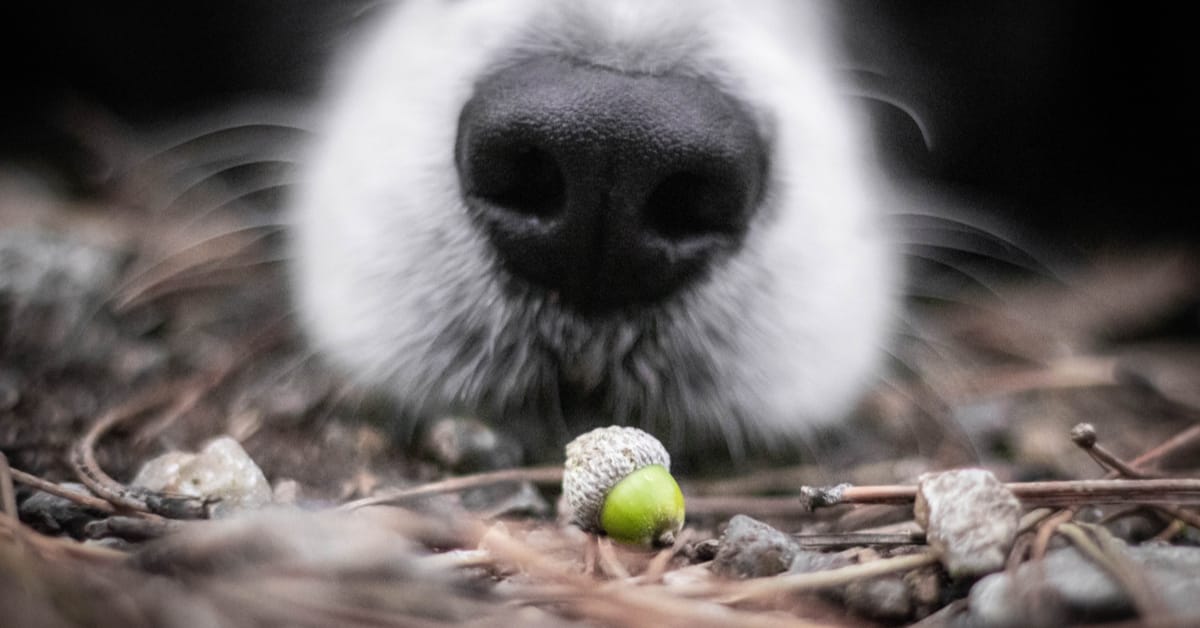Are acorns bad for dogs? Yes, acorns are bad for dogs. In fact, acorns are actually poisonous to dogs. But how can you keep your pup away from them when it’s already autumn and they’re literally all over the ground?
It’s October, which means oak trees (scientific name Quercus) are shedding their leaves and acorns on the reg. Acorns are falling to the ground, on your head, and even denting your car. While this may be a squirrel’s favorite time of year, it can be a hassle for pet parents.
Let’s dive into why eating acorns can be detrimental to your dog’s health, what the symptoms are, how acorn poisoning is treated, and how to keep your dog from eating any more acorns.
Troublesome Tannins

No, we’re not talking about the qualities of your favorite pinot noir.
Tannins are naturally occurring bitter and astringent chemical compounds that can also be found in bark, oak leaves, rhubarb, coffee, and tea, to name a few. Acorns are abundant in tannins, which are not kind to your pet’s digestive system.
Acorn toxicity is caused by this high concentration of gallotannins, which is why it’s key to prevent your pup from eating acorns.
Are Acorns Bad for Dogs? The Symptoms of Acorn Poisoning

Now that you know acorns are bad for dogs, let’s look into what happens if your dog eats too many acorns.
Here are the signs and symptoms of dog acorn poisoning (also known as quercus poisoning):
- vomiting
- collapse
- diarrhoea
- stomach upset
- lack of appetite
- excessive drooling
- lethargic
- bloating
In severe cases, acorn poisoning can cause:
- kidney failure
- liver damage
- toxic shock
- death (rare)
If your dog has only had a couple of acorns, it’s more likely he will have minor abdominal pain/gastrointestinal upset and maybe some retching.
Death is very rare, as is kidney damage. Your dog would have to eat A LOT of acorns in these cases. Kidney damage from acorns is more common in grazing animals like cattle and horses since they are more likely to eat a large amount of acorns.
Acorns can also get stuck in a dog’s throat and present a choking hazard. Acorn ingestion can also cause intestinal blockage in small dogs.
What to do if your dog eats acorns
If your dog eats acorns in large quantities and shows the aforementioned signs of acorn poisoning, you’ll need to call your veterinarian. A DVM will likely do an x-ray or ultrasound to confirm what is causing the illness. If there is a large number of acorns causing a blockage, surgery may be required.
How to keep your dog from eating acorns

Unless you live somewhere that doesn’t have oak trees, limiting your dog’s exposure to acorns will be tricky. Dog owners need to keep a close eye on their dogs when outside, especially smaller dogs, which have a higher risk of a whole acorn getting stuck in their digestive tract.
Other than watching your dog closely, it’s a good idea for pet owners to practice their dog’s “leave it” and “drop it” commands. Have some high-value dog food handy to reward them for listening. Teaching your dog a reliable “leave it” or “drop it” could literally save their life.

